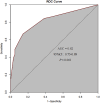Independent risk and protective factors for oxaliplatin-induced hypersensitivity reactions: a retrospective study
- PMID: 40697651
- PMCID: PMC12279837
- DOI: 10.3389/fphar.2025.1624322
Independent risk and protective factors for oxaliplatin-induced hypersensitivity reactions: a retrospective study
Abstract
Introduction: Oxaliplatin (OXA) serves as a first-line treatment for digestive system tumors such as colorectal cancer (CRC) and gastric cancer. OXA-induced hypersensitivity reactions (HSRs) may pose life-threatening risks to patients. This study aimed to explore the risk factors and protective factors of OXA-induced HSRs in Chinese CRC patients.
Methods: A retrospective analysis was conducted on 233 CRC patients who received OXA treatment between June 2022 and December 2022. Demographic data and medical histories were extracted from the hospital's medical record system.
Results: Among the 233 patients, 51 patients (21.9%) developed OXA-induced HSRs, with the median treatment cycle at onset being the 4th cycle. Univariate and multivariate analyses revealed that an OXA treatment interruption lasting ≥30 days (P < 0.05, odds ratio [OR] = 10.76, 95% confidence interval [CI] = 4.57-25.3), a history of platinum-based drug allergy (P < 0.05, OR = 19.03, 95% CI = 1.66-217.99), and abnormal absolute neutrophil count (P < 0.05, OR = 8.96, 95% CI = 3.11-25.86) were independent risk factors. Pretreatment with dual-drug or triple-drug prophylactic regimens before OXA administration was identified as an independent protective factor (P < 0.05, OR = 0.37, 95% CI = 0.17-0.82). The area under the receiver operating characteristic (ROC) curve was 0.82 (P < 0.001, 95% CI = 0.75-0.89). Although previous platinum-based drug dosage and abnormal absolute lymphocyte count showed significant differences in univariate analysis, they did not emerge as independent influencing factors in multivariate logistic regression.
Conclusion: Prolonged OXA treatment interruption, a history of platinum-based drug allergy, and abnormal neutrophil count are independent risk factors for OXA-induced HSRs, while dual/triple-drug pretreatment acts as an independent protective factor. Clinicians should evaluate these risks before medication and consider intensified pretreatment regimens to reduce HSR incidence.
Keywords: colorectal cancer; hypersensitivity reaction; oxaliplatin; protective factors; risk factors.
Copyright © 2025 Xue, Lian and Li.
Conflict of interest statement
The authors declare that the research was conducted in the absence of any commercial or financial relationships that could be construed as a potential conflict of interest.
Figures
References
-
- Cao K., Hollenbach J., Shi X., Shi W., Chopek M., Fernández-Viña M. A. (2001). Analysis of the frequencies of HLA-A, B, and C alleles and haplotypes in the five major ethnic groups of the United States reveals high levels of diversity in these loci and contrasting distribution patterns in these populations. Hum. Immunol. 62 (9), 1009–1030. 10.1016/s0198-8859(01)00298-1 - DOI - PubMed
LinkOut - more resources
Full Text Sources



